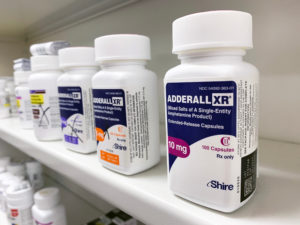If you, your child, or a loved one struggles with the symptoms of attention-deficit hyperactivity disorder (ADHD), you are likely familiar with the medication Adderall. Adderall was first approved by the Food and Drug Administration in 1996 and has since been used for individuals across a wide age range to help alleviate and reduce the intrusive nature of attention-deficit hyperactivity disorder (ADHD) symptoms. When taken as directed, Adderall is considered safe and beneficial. However, when misused or taken by someone other than the patient, Adderall can be highly addictive, and withdrawing from its effects often requires treatment at an Adderall rehab.
What Is Adderall?
Adderall is the brand name for a combination drug used primarily to treat attention-deficit hyperactivity disorder (ADHD) and narcolepsy. Containing a combination of dextroamphetamine and amphetamine, Adderall works within the brain to alter the effects and production of naturally occurring chemicals, including dopamine and norepinephrine. Adderall is used to improve symptoms such as hyperactivity, impulsive behavior, and difficulties maintaining attention span.
Data from the Cleveland Clinic indicates Adderall helps to reduce symptoms related to attention-deficit hyperactivity disorder in up to eighty percent of children and seventy percent of adults. When used in conjunction with behavioral therapies as part of a comprehensive mental health program, the results can be even greater.
Why Is Adderall Addictive?
Adderall is a stimulant medication, making addiction more likely in cases of misuse or abuse. It is not uncommon for people to take Adderall for help with focus, academic performance, to improve their mood, and even decrease their appetite. Unfortunately, these “off-label” uses of Adderall in a manner other than prescribed or by someone other than the patient can lead to addiction and significant side effects.
Adderall works by increasing levels of dopamine in the brain. Dopamine is often referred to as a “feel-good” hormone because it is responsible for feelings of joy, pleasure, and reward. Adderall also increases levels of norepinephrine in the brain. Norepinephrine (along with adrenaline) is responsible for increasing heart rate and blood circulation, resulting in increased energy and alertness. With ongoing use, people eventually build up a tolerance to and dependency on the feelings resulting from Adderall use.
In some cases, if Adderall is no longer available, some people turn to methamphetamine to replicate the “high” experience when taking Adderall. Methamphetamine use is illegal; however, millions of people who once used Adderall either with a prescription or without, turn to it each year if their Adderall prescription ends or they cannot obtain Adderall in other ways.
How an Adderall Rehab Helps You Get Sober
Like other stimulant drugs that produce a “feel good” high, quitting Adderall often requires Adderall rehab. Suddenly stopping or significantly reducing the dose of Adderall your body has become accustomed to may trigger intense withdrawal symptoms in some people. Even when taken as prescribed, Adderall use can lead to physical dependence. If you have developed a physical dependence on the effects of Adderall, withdrawal symptoms are likely. Some of the most common symptoms include cravings, difficulties sleeping, mood changes, appetite changes, panic attacks, anxiety, and fatigue.
In many cases, these symptoms are mild; however, they can be overwhelming in others, leading to relapse or other drug-seeking behaviors. The most effective way to ensure your safety and success when getting off Adderall is to enroll in a supervised detox program. In a supervised setting, trained medical professionals can provide support and guidance as you taper off your Adderall usage and complete the detox process. Suddenly stopping Adderall use entirely is never recommended. For long-term Adderall users, the withdrawal process can be severe and present with medical challenges such as cardiac arrest, seizures, and psychosis. For these reasons, it is always recommended to withdraw under medical supervision.
If you or a loved one is ready to seek treatment and begin your sobriety journey without Adderall, reach out to the admissions team.




